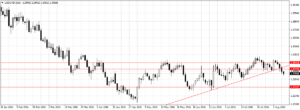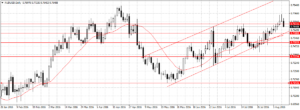Forex Weekly Outlook August 15 – 19
The US dollar lost against most of its counterparts last week, even after the economy added 292,000 jobs in June and 255,000 in July. Most analysts attributed the weakness to worse than expected 1.2 percent GDP growth rate in the second quarter of the year, while some economists blamed it on surge in global risks and uncertainty surrounding Federal Reserve’s rate hike this year.
Either way, retail sales added to the dollar woes on Friday, plunging to a year low in July. Another sign that the consumer spending that has been supporting the US economy is waning as uncertainty increases. Although, unemployment claims came out better than expected and remains below 300,000 for the 75th consecutive weeks –yet consumer sentiment rose less than predicted.
But if July inflation rate and building permits came out positive on Tuesday, the US dollar will likely gain back part of its losses as investors are expected to respond positively because it would cast doubt on the validity of the retail sales figure in the long term. Also, it is good to note that the current market trend is largely being influenced by speculations, like we’ve seen in the Kiwi and Aussie dollar when market participants refused to price in the 25 basis points cut because according to them it was too small.
In New Zealand, the Reserve Bank of New Zealand cut the official cash rate by 25 basis points from 2.5 percent to 2.0 percent, but the local currency rose to a year high, peaking at 73.37 cents to a US dollar as banks reportedly passed just 5 – 10 of the 25 basis points to customers and increased deposit rates for savers by 0.5 percent. Hurting monetary expansion by the central bank to pressure costs in order to boost weak inflation. However, economists and experts have said the central bank needs to lower rate by another 25 basis points to 1.75 percent before the current monetary policy will be effective.
Whereas, retail sales rose in the second quarter of the year by 2.3 percent, exceeding 1 percent expected by most economists and 1 percent recorded in the preceding quarter. This indicates that the economy (consumer spending) is picking up even with high foreign exchange rate and weak consumer prices, but the weak China’s data released on Friday weighed on the local currency, plunging it against the US dollar even after US retail sales came out below expectation. However, if the RBNZ decides to hold off on further stimulus to monitor current improvement, especially with the second quarter employment change, unemployment rate and producer price index due on Wednesday, current stimulus may eventually crystallize.
Last week, the pound remained the worst performing currency for a second week after the Bank of England restarted its stimulus program on Monday. The pound declined 1.2 percent to $1.2911 against the US dollar, and weakened 1.9 percent to 86.51 pence per euro. This week, I will be looking at two currency pairs USDCAD and AUDUSD.
USDCAD
Last week, the Canadian dollar gained with crude oil, following the comments of Saudi Arabia’s Energy Minister Kahlid al-Falih on Thursday that the oil rich nation is prepared to discuss how to stabilize oil prices at an informal OPEC meeting in September.

Click to enlarge
Since then, the Canadian dollar has gained 122 pips against the US dollar, and currently trading below 1.3033 resistance and upward trend line drawn two weeks ago. This week, as long as 1.3033 resistance holds, I am bearish on USDCAD with 1.2723 as the target. The data for Canada’s July manufacturing sales will be released on Tuesday, while inflation rate and retail sales are due on Friday.
AUDUSD
Two weeks ago I explained why I won’t be buying bullish Aussie dollar after the Reserve Bank of Australia expanded monetary policy. Last week, the currency climbed as high as 77.58 cents to a US dollar before retreating due to weak Chinese economic data, this week I think the weak Chinese data of Friday will likely reinforce sellers’ interest considering the 25 basis points cut is yet to be priced in and open up 0.7505 support, but first a break of 0.7588 is important for a bearish confirmation below the channel.

Click to enlarge
Australia’s monetary policy minutes is due on Tuesday, while both unemployment rate and employment change will be released on Thursday.